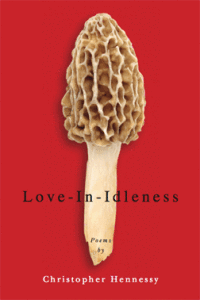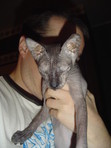Christopher Matthew Hennessy's Blog, page 3
April 9, 2012
Robert K. Martin has died.
Rest in peace, my pioneering star. Your book will always be my bible.
http://www.xtra.ca/public/National/Robert_K_Martin_19412012-11805.aspx
First, Adrienne Rich. Now, Martin.
I feel cored…halved.








April 1, 2012
Can’t get pass the self I want to inhabit
I’ve been unable to get past something I wrote for an interview I did here.
I wrote:
As for Love-In-Idleness, the book’s narrative and lyric identities are my own: gay, Midwesterner, country mouse who’s now a city mouse, son, partner, and storyteller. Lately, I’ve begun to wonder if the more interesting poems, however, are those that are not part of my more stable or comfortable identities—hypersexual being, trickster, nature lover, asshole, magician. These are not who I am. But perhaps they are who I want to be. Maybe that’s where our best poetry happens. In that space of self-making, wish-making—in the conflict of the self and the self-one-desires.
Could that really be true? And do I really want to inhabit those other identities? When I wrote that I felt immediately it was a moment of truth-telling, but then hoped that feeling would diminish. Because I didn’t want to face what that might mean. The feeling hasn’t diminished. And it’s causing a lot of soul-searching.
Speaking of identity, this soul-searching has made me seek out something for which I need your help! Someone out there recently was writing or talking about one of our gay poets who is biracial or black and that this poet has stated that he considered himself more of a gay poet than a black poet because the big ‘issues’ and questions (about desire and self?) he had were connected to his sexual identity rather than his racial identity. I desperately need to find where this comes from! HELP! I’m utterly embarrassed I can’t locate it.
Feel free to pass this plea on to networks in which it would be received with enthusiastic and suggestive responses.








Can't get pass the self I want to inhabit
I've been unable to get past something I wrote for an interview I did here.
I wrote:
As for Love-In-Idleness, the book's narrative and lyric identities are my own: gay, Midwesterner, country mouse who's now a city mouse, son, partner, and storyteller. Lately, I've begun to wonder if the more interesting poems, however, are those that are not part of my more stable or comfortable identities—hypersexual being, trickster, nature lover, asshole, magician. These are not who I am. But perhaps they are who I want to be. Maybe that's where our best poetry happens. In that space of self-making, wish-making—in the conflict of the self and the self-one-desires.
Could that really be true? And do I really want to inhabit those other identities? When I wrote that I felt immediately it was a moment of truth-telling, but then hoped that feeling would diminish. Because I didn't want to face what that might mean. The feeling hasn't diminished. And it's causing a lot of soul-searching.
Speaking of identity, this soul-searching has made me seek out something for which I need your help! Someone out there recently was writing or talking about one of our gay poets who is biracial or black and that this poet has stated that he considered himself more of a gay poet than a black poet because the big 'issues' and questions (about desire and self?) he had were connected to his sexual identity rather than his racial identity. I desperately need to find where this comes from! HELP! I'm utterly embarrassed I can't locate it.
Feel free to pass this plea on to networks in which it would be received with enthusiastic and suggestive responses.








March 30, 2012
Assaracus: a celebration of gay poetry
I just want to publicly thank Bryan Borland and all involved in what was an amazing night in NYC last week. Assaracus: a celebration of gay poetry was a night of poetry, friends, and literary heroes. Subscribe now!
Some highlights of my time:
Getting to see Matthew Hittinger and hear him read from his forthcoming book Skin Shift. (Congrats, Matthew!) I also learned I was pronouncing Matthew's last name wrong. Sorry, man!
Stephen Mills' daring, touching, and funny poem about fisting.
Getting to see Michael Klein (what a powerful reader!) and getting to meet Tony Leuzzi for the first time. They sat behind me and were usually the ones to laugh the loudest at poems with funny moments!
Getting to catch up with Philip Clark and having the honor of signing of book for him.
Getting to thank D. Gilson in person. He knows what he did. Thank you, sir! You read wonderfully
Meeting Eric Thomas Norris for the first time in person and hearing about a new project he's working on! Good luck, sir! It sounds exciting.
Of course, getting to spend some time with Bryan Borland and other great company at Moonstruck diner in Chelsea. (Great choice, M.H.)
But perhaps the highlight—hearing legend Ian Young speak, and hearing him read Whitman more powerfully than I've ever heard. My spine tingles just remembering it. Thank you, Ian.
( I know I'm leaving out people and things. Advance apologies. I should haven't waited to long to post this! My brain isn't what it used to be.)
Assaracus and SRP lovers: If you liked he poems I read that night and would like a copy of my book at a discounted price, just email me at Christopher.Hennessy at gmail dot com with a note about if you were a reader or there to hear someone read or just a gay poetry lover. I'll send you a copy for $10 (and I'll pay shipping and handling)!








March 22, 2012
I’m interviewed on the cool site Yrteop.com
I had so much fun doing this interview. I hope you like it too. If you do, please Tweet it or share it on Facebook or on your blog. Many thanks to Chris at Yrteop.com! Here’s a few moments excepted to give you a sense of what we talked about:
I think you make a body real in a poem, and this might sound counter-intuitive, by connecting it to an image or sense that will pull the reader away from the familiar—the body is perhaps the thing most familiar because we inhabit it every second of every day—and into the unimagined. It’s a tall order, and I don’t always do it.
—
I should also say the worst thing—the killing-est thing—can be to have even the slightest fear of the body, of revealing it, of wanting it. One of the true formative moments for me as a poet, and also a Rubicon moment, was when my mentor at Emerson brought me into his office to read a poem. There was an image in the poem of a beautiful man, running on the beach, I think, wearing only a pair of tiny hot-pink shorts. (I’ve been trying to find that poem ever since; I wonder now if it even existed or if I’ve created it because I needed it.)








I'm interviewed on the cool site Yrteop.com
I had so much fun doing this interview. I hope you like it too. If you do, please Tweet it or share it on Facebook or on your blog. Many thanks to Chris at Yrteop.com! Here's a few moments excepted to give you a sense of what we talked about:
I think you make a body real in a poem, and this might sound counter-intuitive, by connecting it to an image or sense that will pull the reader away from the familiar—the body is perhaps the thing most familiar because we inhabit it every second of every day—and into the unimagined. It's a tall order, and I don't always do it.
—
I should also say the worst thing—the killing-est thing—can be to have even the slightest fear of the body, of revealing it, of wanting it. One of the true formative moments for me as a poet, and also a Rubicon moment, was when my mentor at Emerson brought me into his office to read a poem. There was an image in the poem of a beautiful man, running on the beach, I think, wearing only a pair of tiny hot-pink shorts. (I've been trying to find that poem ever since; I wonder now if it even existed or if I've created it because I needed it.)








March 9, 2012
Love-In-Idleness is a finalist for the Thom Gunn Award for Gay Poetry
 Well, damn. DAMN! I am so excited to announce that my book has been named a finalist for the Publishing Triangle's Thom Gunn Award for Gay Poetry. I am so honored to be in the company of the other finalists:
Well, damn. DAMN! I am so excited to announce that my book has been named a finalist for the Publishing Triangle's Thom Gunn Award for Gay Poetry. I am so honored to be in the company of the other finalists:
A Fast Life: The Collected Poems of Tim Dlugos, by Tim Dlugos (Nightboat Books)
Motion Studies, by Brad Richard (The Word Works)
Touch, by Henri Cole (Farrar, Straus and Giroux)
Learn more about the award and the other categories and finalist!
Band of Thebes has a break-down of some of the categories.
CONGRATS TO ALL THE FINALISTS, including my friend Garth Greenwell for his debut fiction Mitko.
Thanks, Publishing Triangle!








March 3, 2012
My poem appears on “Poetry Daily” today!
I am so freakin’ thrilled to have my poem “Carriers” on today’s Poetry Daily site. This morning I got emails from some folks who read it (a former workshop peer, a stranger, friends, etc.) and said how much they liked it. God that felt good! I think sometimes we need to say that. “God that felt good.” Thank you guys. You made my day. And thanks to Poetry Daily for featuring me, my book, the poem. What an awesome site!








My poem appears on "Poetry Daily" today!
I am so freakin' thrilled to have my poem "Carriers" on today's Poetry Daily site. This morning I got emails from some folks who read it (a former workshop peer, a stranger, friends, etc.) and said how much they liked it. God that felt good! I think sometimes we need to say that. "God that felt good." Thank you guys. You made my day. And thanks to Poetry Daily for featuring me, my book, the poem. What an awesome site!








February 18, 2012
For poets…”It’s simply the world.”– Eileen Myles
From a review Eilen Myles wrote on Muriel Rukeyser’s The Life of Poetry:
“Poetry’s so tiny it’s universal: A famous painter might be invited by The New York Times to give us a tour of the Met, to show us what he knows, but for poets there’s no such building, or even bookstore. It’s simply the world.”











